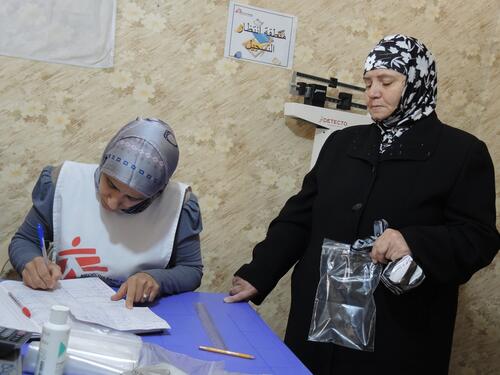“Non-communicable chronic diseases” include cardiovascular disease, hypertension, diabetes, asthma and cancer. Most cannot be cured and they develop gradually. These diseases are generally asymptomatic until complications appear, such as heart attack, stroke, kidney failure and the onset of blindness. They are increasingly common around the world, particularly in urban and periurban centres and have the same risk factors: sedentary lifestyle, poor diet and smoking. Complications can be prevented if patients receive appropriate, timely and ongoing treatment.
Since April 2012, Médecins Sans Frontières (MSF) has managed a chronic disease treatment programme in Lebanon to meet the desperate needs of Syrian patients, who no longer have access to treatment.“What do you want me to eat? I’m fleeing a country at war,” says Leïla, a 62-year-old Syrian woman with diabetes. She is a refugee in the Bekaa Valley region of eastern Lebanon. “The doctor told me to eat vegetables, but I eat what I’m given. There's no other choice."
“Nearly 90 per cent of our patients arrive with prior diagnoses of chronic disease – typically hypertension and diabetes,” says Dr Wael Harb, MSF supervisory doctor in the Bekaa Valley. “The condition worsens quickly if they haven’t received treatment for weeks. With the war in Syria, their disease is not the priority. Access to food, water and housing – basic vital needs – is more important. In addition, they often lack the money to pay for transportation to a health facility and to buy medicine. For people with diabetes, diet is particularly problematic. We treat many patients who come to our facilities with hypertension and uncontrolled diabetes, which can lead to loss of consciousness, heart attack and coma”.
Critical needs, limited resources
As a humanitarian organisation offering free treatment to Syrian refugees with these kinds of diseases, MSF sees a large and growing influx of patients at its facilities. However, MSF faces limited financial and human resources.
“The clinics are overburdened,” explains Dr Bénédicte de Kalbermatten, a chronic disease specialist. “At MSF’s facilities in Lebanon, a doctor can spend just eight to 10 minutes with a patient on average. That’s an extremely limited amount of time to perform an examination, make a diagnosis, decide on the treatment, explain it all to the patient and prescribe the necessary drugs. It seems impossible in theory but our doctors manage in practice.”
Continuity of care is also critical to treating patients with a chronic disease. “This involves a commitment and an ongoing relationship between patient and doctor,” says Dr de Kalbermatten. “But in this context, the patients are refugees. They do not live in a stable situation. It is difficult to provide appropriate monitoring, which can compromise their treatment.”
Adapting treatment protocols to humanitarian emergencies
“As a medical humanitarian organisation, MSF traditionally works in emergency settings where infectious diseases predominate,” says Dr Philippa Boulle, medical advisor at MSF. “Until now, we have developed only limited expertise in treating chronic disease on a long-term basis. Today, to ensure that Syrian refugees have access to effective treatment, we must innovate and adapt treatment protocols designed for European and North American treatment models to humanitarian emergency situations.”
With support from chronic disease experts, MSF is now developing innovative approaches that are better suited to this kind of context. The organisation is focusing particularly on diabetes and hypertension, which are widespread among Syrian patients. Similar approaches will also be developed to treat other non-transmissible chronic diseases, such as angina, asthma and epilepsy.
In 2013, MSF provided more than 17,900 consultations for patients with chronic diseases at health facilities in Tripoli and the Bekaa Valley in Lebanon, as well as in the Domiz refugee camp in northern Iraq.
MSF continues to put all efforts toward securing the safe return of our colleagues who were taken from an MSF house in northern Syria on the evening of 2 January 2014 while on assignment to provide medical care to Syrians suffering from the war. Since MSF started running makeshift hospitals and clinics in northern Syria in June 2012, the medical teams have provided more than 140,000 consultations, many for trauma wounds and life-threatening chronic diseases. More than 2,000 women have been assisted with safe deliveries. Despite the immense challenges, MSF maintains the provision of medical assistance to Syrians who are suffering.



